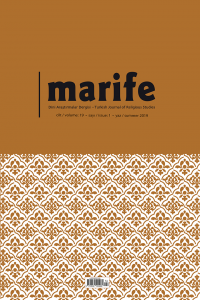
Marife Dini Araştırmalar Dergisi
Yazarlar: Mustafa Harun KIYLIK
Konular:Din Bilimi
DOI:10.33420/marife.770446
Anahtar Kelimeler:Islamic Law,Religion,Pious,Doubt,‘Azîma
Özet: The term "religious", which generally refers to belonging to a religion, is used for individuals who are strictly adhered to religious orders and prohibitions, who are meticulous and careful in religious affairs, and who experience religious knowledge by internalizing them. Therefore, this term mostly implies a better devotion to religion. In this sense, the religious individual who places religion at the center of his life shapes his preferences in this direction. Sociologists who have studied the effect of religion on society have chosen to make some definitions and set some criteria for religiosity. As with the definition of religion, it is seen that religiosity is described in different ways too. Hence, it seems hardly possible to measure the levels of religiousness of individuals due to the subjective nature and transcendency of the term religiousness. However, some external criterion such as the style of clothing, the shape of facial hair, usage of some religious terms, practicing the religion openly might provide some opinion about people’s religiosity. However, in Islam, actions that do not penetrate a person's heart and remain only in behavior are not really credited. In this context, it has been criticized that a formalist understanding is placed at the center of religiosity, considering formal worship as what counts. Failure to show the necessary seriousness in putting belief into action was seen as a major problem, as did religiousness remain in just behaviors. For this reason, there has been a need to characterize all manifestations of religiosity with different titles such as "deceitful / pretentious religiosity", "imitative religiosity", "investigative religiosity" and "enjoyed religiosity". Therefore, a religious individual takes actions as required by his/her faith, and there are many examples of these advices in the Quran and Sunnah. The obedience to Allah and his last prophet, a faith that is so strong, a tender conscious, performing rituals, and being known as trustworthy are a couple of these aforementioned advices. Of course, just as in everything, excessive praying is prohibited. In this sense, it is significant that the Prophet Muhammad warned those who plan to fast every day, not to marry, and those who plan to pray and not sleep, and to advise them to live their life of worship within their power. From the perspective of fiqh, worshipping/ performing rituals is among the most important indicators of religiosity. Also, in fiqh, there are some other situations that may be indicators of religiosity. For example, the fact that a believer avoids doubtful actions and acts with tenacity can be shown among these indicators. That is to say, it is not clear whether the relevant issue is halal or haram in case of doubt that express hesitation and indecision arising from the inability to reach definite information and conclusions since there is not enough evidence in terms of fiqh. This situation prevents the mujtahid from making a definite judgment on the aforementioned issues and causes the responsible person to hesitate on issues that he does not know exactly whether it is haram or halal. Here, there are two ways for the believer to do or leave the suspicious thing. The fact that this person chose to follow the advice of the prophet Muhammad on the acts that are not clear to be halal or haram, is an example of the other indicators of religiosity. As for the basic provisions, that is, in the absence of any exceptions, which are required to be performed separately by each believer and expressed as "azîmah", except in cases where he will be a sinner when he does not act with the license, it will be a different manifestation of his piety. Although there is a license not to fast while on a voyage, there are signs that fasting on voyage is better and therefore the person who chooses to fast will be seen religious, but there are also cases where it is not known whether using the license or act on azîmah is superior. In situations like this, the fact that someone acts on azîmah is seen as another indicator of that person’s religiosity. In this study, by avoiding technical details and disagreements regarding both issues, namely abandoning doubtful things as well as acting on azîmah, only the effects of the aforementioned issues on religiosity and their reflections in Islamic law are explained. Also it is questioned whether acting on azîmah can be accepted as an absolute indicator of religiousness or not.